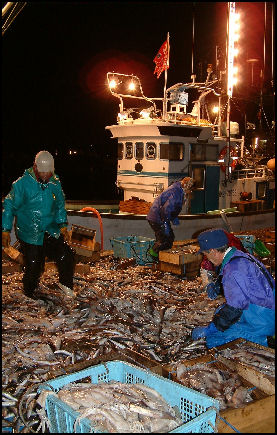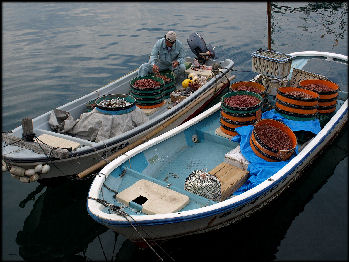

Japanese boats that spend long periods of time at sea rely on foreign workers, many of them from Indonesia. Many get paid less than the minimum wage for foreign workers of $375 a month. Sometimes they are paid considerably less than that. One Indonesian seaman told the Yomiuri Shimbun the most he was paid was $280 a month. “Sometimes, I’m only paid $150,” he said. Most are hired by brokers in their home country and presumably some of their pay goes to them.

Not only are foreign fishermen poorly paid, they also work like dogs. One told the Yomiuri Shimbun, “I slept only three to four hours a day. It was grueling work with no breaks. The toughest part was constantly being tossed about in a narrow cabin by waves for four to six weeks.”

Some of foreign workers come to Japan as trainees and are paid around $1,000 a month during their training period but their pay drops to between $300 to $700 a month, including overtime, when they start working as seamen. Many find the work to difficult and run away. Some flee their boats in Japan and find better paying jobs.
Dangers Faced by Japanese Fishermen

Every few months or so some fishermen go missing after their boat capsizes in rough seas or die when their boat collides with another vessel in Japan’s busy coastal waters. In September 2007, four fisherman went missing after their boats capsized off Kinkazan island in Miyagi Prefecture in southern Kyushu when winds picked up to 36 kph and waves were four meters in height. In April 2008, eight people died when their scallop-fishing boat sunk in rough seas off Aomori in northern Honshu.

In April 2004, three of four crew members aboard of South Korean fishing docked in the port of Oda were found dead, asphyxiated by a gas created by rotting squid guts slated to be used in a salted snack. The three men were found in sections of the ship where the guts were kept.


In September 2005, seven of eight fishermen were killed on 19-ton saury fishing vessel that capsized off of Nemuro, Hokkaido after it was struck by a 41,507-ton large Israeli-flagged container ship.

In December 2003, four died when a fishing boat sank off Shimane Prefecture. The 80-ton ship with a 10-man crew ran aground on a shoal and was overturned and sunk because of large waves and strong winds The surviving crew members were rescued clinging to rocks.

In October 2008, three fishermen were killed when a 14.75-ton fishing boat with six fishermen on board and a 9,813-ton cargo ship collided about 1.8 kilometers south of Minna Island in Okinawa Prefecture. All six of the fishermen were thrown into the water.

On April 2008, twelve of the 22 crew member aboard a Japanese fishing boat went missing after their 135-tom vessel capsized and sank off Hiradojima Island, Nagasaki.

In May 2009, a tuna boat caught fire and the crew had o abandon ship. Four people were initially reported missing. One was found dead, Another was found alive in a life raft. Two others were never found.

In October 2009, three men were rescued at sea after spending three days in an upside down capsized boat in seas off Hachijojima island. The men huddled in a small air pocket in a compartment of the 19-ton boat after it was capsized by waves from a typhoon. One survivor told Kyodo, “I was wondering inside the boat how I’d die. And it felt horrible to think about when I might stop breathing.” The three men had little to eat and shared a small amount of water. They were very hungry and slightly dehydrated when they were rescued by the Japanese coast guard. Five other crew men on the boat died.

In 2008, fisherman in Surga Bay began wearing life jackets after a series of fatal boat accidents left five people dead.

In January 2008, a 55-year-old fisherman was rescued after treading water for 15 hours after his boat capsized off Miyakojima Island in Okinawa Prefecture

In July 2011, Kyodo reported that a 70-year-old fisherman adrift for 20 days was found safe by the Japan Coast Guard. Ryoko Shimabukuro, of Ie, Okinawa Prefecture, was found aboard the boat drifting off Cape Muroto, Kochi Prefecture, following a report sent by a foreign vessel to the 5th Regional Coast Guard Headquarters in Kobe. Shimabukuro appeared to be in good health and said his boat had encountered engine trouble, officials said. According to the fishing cooperative in his village, Shimabukuro left port June 8 and planned to return after around 10 days. He was last seen off Cape Hedo, Okinawa, on the evening of June 10. [Source: Kyodo, July 1 2011]
OBLIGACIÓN DEL PROPIETARIO DEL BUQUE
The Ship Dueño notificará a la Agencia catorce días antes de la tripulación hacen a bordo en el buque ", y hacer que el organismo encargado de la preparación de la salida de la tripulación, el barco y el espíritu necesario en el buque-Empleo en el ámbito posible antes de la salida de la tripulación en INDONESIA.
OBLIGACIÓN DE LA AGENCIA
- 1. LA AGENCIA reclutará y abastecer a la tripulación que sinceramente calidad y posee la cualificación para el empleo del armador.
- 2. LA AGENCIA realizará cada procedimientos y preparación a fin de que la tripulación, que está sano y tiene la calificación como la tripulación de conformidad y regulación de Indonesia se partió en el lugar y la fecha designada por el propietario del buque sin ningún problema y debe presentar los NAVE PROPIETARIO la lista de tripulantes, número de pasaporte, número de libro marinero, y el documento de que se trate a VISA.
- 3. LA AGENCIA será seguro para educar a la tripulación sobre el trabajo y enviar a LA NAVE libro PROPIETARIO educación asuntos necesarios antes de la salida de la tripulación, y cumplir con las regulaciones locales y la ley (Los medios locales para incluir ESPAÑA) y el país con que el buque entre en) y cada reglamento solicitado por el propietario del buque.
- 4. LA AGENCIA será inmediatamente enfermizo armador del cambio personal de tripulación.
Período de empleo
El período de trabajo de la tripulación será generalmente por dieciocho meses. él no puede regresar durante la navegación del buque y su operación de pesca, y debe trabajar en el buque hasta que el buque pone en el puerto.
Cuando hay solicitud de transferencia a otro buque que de acuerdo a la dirección del armador durante el período de empleo, debe ser aceptada. El armador se notificará a la Agencia de ello al mismo tiempo que la tripulación se transfiere a otro recipiente.
El período de trabajo de la tripulación será efectivo desde la salida de la tripulación de Indonesia y de la fecha de llegada de Indonesia, y en relación con el procedimiento de entrada y salida incluyendo el pasaporte, visa, permiso de entrada de la tripulación. LA AGENCIA se encargará de los procedimientos dentro de Indonesia y los de la región de embarque y desembarque serán realizadas por el propietario del buque.
GASTOS DE EMPLEO (GASTOS DE VIAJE DE EQUIPO)
"LA AGENCIA" se cubrirá gastos de viaje de entradas de aire. En caso de los equipos devueltos causadas por ellos aún no han terminado su contrato por los equipos poseen, LA AGENCIA sería llevar el viaje.
En el caso de los equipos devueltos causados por que había terminado el suyo contrato dentro de DIECIOCHO meses, el propietario del buque sería GASTOS viajan suyos oso.
Entre el desembarco media, los gastos de devolución de la tripulación que ha sufrido la lesión mientras estaba de servicio será totalmente liberado por "armador" y la de la tripulación que regresa por su propia opción en su totalidad por "LA AGENCIA", y esta cantidad se deducirá preferentemente en la remisión de los salarios. (SIN EMBARGO, EN CASO DE MEDIO desembarcó DE TRIPULACIÓN, el armador deberá presentar la propia declaración de la tripulación, los gastos que llevan declaración jurada y el informe sobre la marcha del capitán / PESCA MASTER para la agencia.)
HORAS DE TRABAJO EN BARCO
- Las partes tendrán que comprender que la hora de trabajo de la tripulación ESPAÑA, que hacen en barco y obras, no está determinada legalmente, y la tripulación aplicada por el AGENCIA.will acatar la hora de trabajo equivalente a la de la tripulación ESPAÑA, y se llevará a cabo por la dirección de CAPITÁN / PESCA MAESTRO basado en el especial de trabajo de la pesca.
- Las Partes establecen una regla para realizar la banda consentimiento mutuo acuerdo durante la vigencia del contrato, y el propietario del buque y de la Agencia de forma conjunta y estrictamente educar a las tripulaciones con el fin de que los accidentes desfavorables a las partes no será causado, y la tripulación de Indonesia no debe ser tratado de forma diferente a partir de la tripulación ESPAÑA en el trabajo y en el recipiente de la vida.
- la tripulación debe realizar el trabajo necesario para la seguridad como buque en peligro o rescate de la tripulación de ese buque en cualquier momento sin la compensación adicional.
SALARIO (ARRASTRE-VOLANTA-CERCO) :
- JEFE MAQUINAS : $ 2000/Mes
-2ND JEFE MAQUINAS : $ 1500/Mes
- ENGRASADOR : $ 550 /Mes
- CONTRAMASTRE : $ 800/Mes
- COCINERO : $ 800/Mes
- 2ND COCINERO : $ 600/Mes
- CAMARERO : $ 350/Mes
- MARINERO : $ 350/Mes
SALARIO PALANGRERO ( ATUN-BACALAO-EZPADA)
- JEFE MAQUINAS : $ 2000/Mes
-2ND JEFE MAQUINAS : $ 1500/Mes
- ENGRASADOR : $ 650 /Mes
- CONTRAMASTRE : $ 800/Mes
- COCINERO : $ 800/Mes
- 2ND COCINERO : $ 600/Mes
- CAMARERO : $ 350/Mes
- MARINERO : $ 450/Mes










 Japanese boats that spend long periods of time at sea rely on foreign workers, many of them from Indonesia. Many get paid less than the minimum wage for foreign workers of $375 a month. Sometimes they are paid considerably less than that. One Indonesian seaman told the Yomiuri Shimbun the most he was paid was $280 a month. “Sometimes, I’m only paid $150,” he said. Most are hired by brokers in their home country and presumably some of their pay goes to them.
Japanese boats that spend long periods of time at sea rely on foreign workers, many of them from Indonesia. Many get paid less than the minimum wage for foreign workers of $375 a month. Sometimes they are paid considerably less than that. One Indonesian seaman told the Yomiuri Shimbun the most he was paid was $280 a month. “Sometimes, I’m only paid $150,” he said. Most are hired by brokers in their home country and presumably some of their pay goes to them.